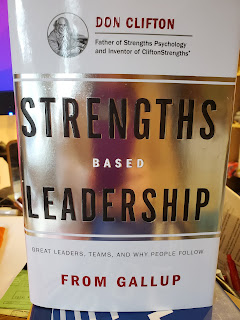Personality Testing Extravaganza: I'm a Tolerant Empathetic Achiever
Over the course of the last few months come on I've had the opportunity to take a number of personality tests. As we grow as an organization, we are trying to learn about 1 another and it seems we are using a variety of tools to do that.
Being the researcher that I am, I reviewed all of the insights to see what I could learn in total.
For the uninitiated, here are the key strengths of each of these tools. Disclaimer: I'm not an expert on these tools, just a participant.
Enneagrams - There are a total of 9 Enneagram types and the tool helps determine your dominant personality traits. It helps us see ourselves at a deeper and more objective level creating a path to self knowledge. More on how this all works.
Gallup - The Clifton StrengthsFinder, owned by Gallup, uses 177 paired statements to determine your top 5 strengths to maximize your potential. Paired statements might be something like "I read all of the instructions before beginning / I jump into things." And you click on an area that most represents your identification with that statement. Do that 177 times and your strengths start to surface.
Core strengths - This tool helps you understand again, your core strengths and adds on how they work in relationship. How do you manage conflict? What do you do that might seem overdone? Their Strengths Deployment Inventory includes Motivational Value System and a Conflict Sequence questions. You can nerd out on the full history here.
As I mentioned, I am no expert on any of these tools, but taking all of the assessments in a relatively short period of time made me want to unpack the insights for trends and patterns.
From all of these tools, here's what they determined, and what resonates for me.
From my perspective, the prominent traits and themes that describe me include empathy, helping others achieve and wanting to be respected and "successful."
Looking at the Core Strengths, I "achieve feelings of self-worth by actively encouraging others to grow, succeed, and accomplish great things." According to the Enneagram, I am an achiever -- "self-assured, attractive and charming" (their words not mine) with a "fear of being worthless and a desire to feel valuable." Finally the Clifton StrengthsFinder highlights my fascination with ideas, ability to sense others feelings, the fact that I'm inspired by what the future could be, am intrigued with the unique qualities of each person and lean into strategic thinking determining the most efficient and best way to move forward.
Clearly, the 1-liners are quick summaries and each program provides a lengthy report or set of insights. So what is one to do with all of this information?
The information is more helpful when used in an organization versus on your own. It's interesting to know more about who I am, but highly valuable when I compare my results to others on my team or so we can understand what makes each other tick.
The Core Strengths does provide a tool that allows you to compare your strengths with others on your team. By doing that, I learned that my manager and I have some very opposite strengths where I focus more on people he focuses more on performance. That means, as a management team, we can divide and conquer and lean into our strengths.
Core Strengths also helps you understand how you react in conflict. Again, mildly helpful on my own, but likely very helpful for my team members and peers to know that I crave harmony, want to minimize confrontation and feel anxious when there's conflict. (Could I have told you that? Yes. Is it easier when it's presented objectively? Also yes.)
As I review all of these traits, it's also interesting to see the highlight and the shadow. A personality trait can be valuable for its positive impacts, or be a detriment by going over the top with that trait and having a negative influence. For example, yes I am highly tolerant of different ideas and perspectives but that can also be interpreted as being indifferent or not having a strong opinion.
The largest value of these personality tests is what you do with the information. For now, I have some clarity on what strengths I bring to the table (where to lean in), how I'm perceived and how I experience conflict. It seems I'm in the right job in management since seeing others grow is important to me, and have an excellent career match as a UX Researcher with my ideation, empathy and future focus. It would be wonderful to be able to be more comfortable with conflict, so for now, that's a great stretch goal and something I'm actively working on.
If we work together, I hope this gives you more insight into what makes me tick. For all readers, I hope you are curious enough to jump into one of these personality tests and find out more about yourselves.



Comments